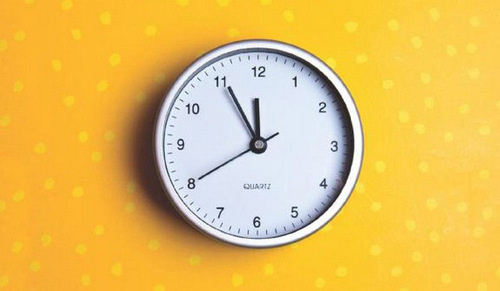How to increase the accuracy of the internal clock and begin to better understand the time
- Transfer

If you regularly overestimate or underestimate the amount of time it takes to complete a task, it may be time to reload the internal clock. Below you will learn how to do this and achieve more with lesser nerves.
Accurate internal clocks are the cornerstone of time management. If the evaluation of units of time and what you can catch on with these units is difficult for you, then you will always be upset about things that you cannot finish on time.
Psychologists Jane Burka and Lenora Ewan offer in their book Procrastination: Why You Do It, What to Do About It NOW a series of specific exercises to improve your own time management.
Practice time

Due to the tendency to overestimate our own abilities, lack of practice or chronic stress, many of us fail to accurately determine the time. Burka and Ewan explain this by the fact that age, dopamine levels and wishful thinking impair our ability to adequately evaluate the passage of time. (Photo by John Mitchell )
First, you need to start measuring what you spent in realitytime. If, for example, it is in your head that the daily trip to work or study takes 20 minutes, although in reality, taking into account the morning flow, it turns out 35, then the morning procedures will need to be adjusted accordingly. Same thing with a morning shower; if a peppy 10-minute rinse is actually a slow awakening lasting 25 minutes, then it’s immediately clear where the additional 15 minutes go every morning.
If you don’t wear a watch, then this is a great reason to get one. Also, start a simple journal of where your time goes, whether it's in a small notebook or mobile application (like Timr for Android ). If you spend most of your time at the table, desktop time trackers can come in handy.. Spend a week or two getting to know the amount of time that is actually spent on routine trips, preparing reports at work, preparing dinner, and other daily activities.
Learn to use small intervals

Here, Burka and Ewan offer a great Swiss cheese method invented by Alan Lackeyin. Its essence is that the schedule of each project should have holes, like Swiss cheese. If the task takes 10 hours, this does not mean that 10 hours should pass in the marathon mode. It is better to leave time intervals in advance that can be spent on small fragments of larger projects. These time windows can be used as efficiently as possible if the bag or phone already contains a list of projects or, for example, calls that need to be made. (Photo by Patrick Hoesley )
A timer may also come in handy here. If you are often distracted from work or, conversely, cannot find the strength to break away, it is convenient to use the timer to create a perceptible deadline. Start a timer for 30 minutes and focus on the project, then switch to another or take a well-deserved break.
Anticipate distracting situations

A close relative of poorly tuned internal clocks are inadequate hopes for concentration. To some extent, your plans will definitely be disrupted. Whether it is a small crisis at work, taking an allotted hour to prepare a monthly report, or being late for work for two hours due to a blizzard, external forces regularly try to knock you out of the schedule. Get ahead of plans whenever you can. (Photo by Michael Karshis )
Effectively distribute responsibilities

The attitude “I can do all this” is the main destroyer of all time management techniques. Many people are reluctant to share work, either because they consider themselves the only ones qualified enough for it, or because the load distribution is for losers who are not good enough in their profession to do everything on their own. Burka and Ewan rightly insist that these are myths that plague the offices and are often an excuse for postponing work. Learn how to allocate responsibilities and focus on the tasks that need to be completed most. (Photo tableatny )
Find your best time

Although the numerous cups of coffee and Puritan commitment to work ethics give us a feeling of constant vigor and readiness for everything, the feeling is false. Someone is ready to work immediately after jumping out of bed, while someone has a peak of activity after sunset. As part of your time tracking project, pay attention to what time of day you are most effective and concentrated. Most of us work during normal hours, although we would achieve better results a little earlier or later. Do not forget about your diet, because it may be that you are not really an “owl,” but simply do not eat normally before dinner and therefore get a noticeable surge of strength from it. (Photo by Martin Petitt )
Start scheduling and enjoy your free time.

People with poor time management skills are trapped when it comes to leisure activities. You can be distracted by all sorts of pleasant things during work, but half an hour of real rest after a hard day relax much more than half an hour of sailing along it. One of the advantages of controlling your own time and schedule is knowing when to stop working and do personal things, sleep and relaxation. The work will go much better when you know the exact time of its completion and that after it you will have a rest with a clear conscience. (Photo d3b )
